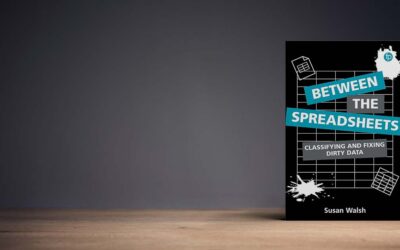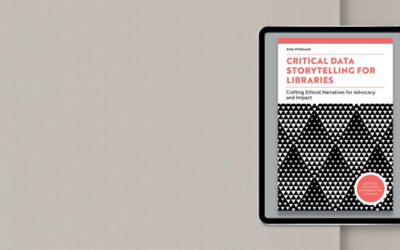Interview with the Editors: Crum and Nunez, Essential Leadership Skills for Health Sciences Information Professionals
Lauren Hays
Janet Crum and Annabelle V. Nuñez co-edited Essential Leadership Skills for Health Sciences Information Professionals. My interview with them is below.
1. Please introduce yourselves to our readers.
I am Janet Crum, Director of the Health Sciences Library at the University of Arizona in Tucson.
I am Annabelle Nuñez (she/her/ella), Associate Director of the University of Arizona Health Sciences Library (UAHSL) in Tucson. My entire career as a librarian has been at UAHSL. Eighteen years!
2. Will you briefly summarize Essential Leadership Skills for Health Sciences Information Professionals?
Janet: Essential Leadership Skills for Health Sciences Information Professionals includes 11 chapters, each providing an overview of an essential leadership skill written by an experienced health sciences library leader. Chapters cover the following topics: understanding the health sciences library environment; building relationships and engaging stakeholders; setting direction; building and leading the library team; engaging your staff; leading with a focus on diversity, equity, and inclusion; planning and managing projects; leading and managing change; decision-making and problem-solving; crisis leadership; and managing and taking care of yourself.
My favorite thing about the book is the many decades of wisdom contained in its pages. It was a privilege to work with such skilled and experienced leaders.
Annabelle: The book provides practical advice for library leadership. Our contributing authors, with extensive leadership experience collectively, outline helpful, step-by-step recommendations to implement administrative and managerial models and operational best practices.
3. Why did you decide to edit this book?
Janet: Leadership is hard, and the skills that make us good librarians are not necessarily the same skills that make us effective leaders. No one is born knowing how to lead, yet too many librarians are promoted into leadership roles with little to no training to help them be successful. Ineffective (and sometimes even toxic) leadership leads to high turnover, stress, and burnout in the library workforce.
Formal leadership training is expensive in terms of both time and cost, so it isn’t an option for everyone. This book is intended to help bridge that gap by giving new leaders a quick way to get familiar with important leadership concepts, and also find recommended reading for digging deeper.
I want every leader to succeed and help those they lead to have healthy, rewarding careers in health sciences librarianship.
Annabelle: My co-author, Janet Crum, graciously invited me to work with her on the book. She is a fantastic writer and writing mentor! She pitched it as more of a handbook. This idea appealed to me, especially considering who could benefit from such a book. I believe it can offer new knowledge to experienced library directors and provide essential information for new and early career librarians, not to mention the education a library school student would get from reading it – if it were assigned, for example, to a class.
4. How has the work of health science information professionals changed recently? And how you do see it changing in the future?
Janet: Wow, where to begin…? Let’s start with the really obvious: the COVID-19 pandemic has changed the way we work, likely in permanent ways. Many of us are now leading hybrid teams and managing remote workers. We’re teaching online, synchronously and asynchronously. Many of us—and the people we lead and manage—have been rethinking the role of work in our lives. We’re still adapting to changing workplaces and educational environments and trying to figure out which of our old ways we want to hang onto and when to let the past go and build something new. Just like everyone else in the world.
Two other big changes predate the pandemic but seem to be accelerating. One is that libraries and librarians are viewed more and more as partners rather than assistants. Researchers invite us to join systematic review teams. Colleges invite us to develop and teach courses. Hospitals invite us to round with clinicians. These kinds of collaborations are professionally rewarding and demonstrate that our constituencies recognize our value, but they also require significant amounts of dedicated time and specialized knowledge. Another big change is the increasing—and long overdue—focus on diversity, equity, inclusion, antiracism, and racial justice. We’re moving from the annual antidiscrimination training model to deeper engagement, which will—or at least should—cause us to rethink long standing approaches across our organizations to create more equitable environments and services. These efforts will also require lots of dedicated time, which means we will need to find efficiencies, reprioritize existing work, and probably let some legacy work go.
I see all of these trends continuing into the future. We’ll also be challenged by new technologies, especially AI: Chat GPT and similar tools for sure but also an increased role for AI in systematic reviews. And we’ll be challenged by trends in the healthcare industry. Here at the University of Arizona, our president just spoke with the Arizona Board of Regents about doubling the number of medical school slots and increasing the size of other health programs to address the current crisis in health care staffing. Meanwhile, rural and community hospitals are struggling, consolidating, or closing entirely.
And finally, we’re facing an epidemic of health misinformation and disinformation and deep distrust of experts of all kinds—hugely accelerated by the pandemic and the polarizing politics surrounding it. As health information professionals, we must find ways to (pardon the pun) inoculate our user communities against this threat.
But I don’t want to imply that our future is bleak. We live in challenging times, but along with those challenges come many rich opportunities for information professionals to make deep, positive impacts on our clients, colleagues, and communities.
Annabelle: I echo what Janet says about the recent changes in the work of a health sciences information professional. With what she has outlined as the changes for the professional, I think library schools must stay up to speed with said changes, particularly around the advances and implementation of new technologies. It would be beneficial to library school students as they prepare for the workforce.
5. What do you hope readers take away from reading this book?
Janet: I hope they take away a few things. First, leadership is a skill that can be learned. The best leaders have the curiosity and humility to keep learning, to keep getting better. Second, leadership is both challenging and deeply rewarding. It’s a privilege to be able to make a positive difference in the lives of those we lead and to influence the direction of our libraries and institutions. I think the rewards as well as the challenges of leadership come through in this book and in the voices of the leaders who contributed to it. Finally, I hope this book can be a source of comfort and inspiration in both good times and bad. As the cliché goes, “It’s lonely at the top,” but you are not alone. You are part of a community of leaders, all of us trying to do the best we can, learning as we go.
Annabelle: I hope readers can adopt and adapt the information to their work in libraries or apply it to their professional growth. I especially hope the book can give emerging leaders a sense of what it takes to run a library and ultimately prepare them for upward mobility in the profession.
6. Is there anything that surprised you as you read the submitted chapters?
Janet: This will sound weird, but I was surprised at how much I learned. I expected to learn things I didn’t know—neither I nor anyone else will ever know everything about leadership—but I was quite humbled by how many ideas I took away that I hadn’t thought about before. There are so many different approaches a leader can take and so much that even very experienced leaders can learn.
Annabelle: I was surprised at the diversity of reporting models in health sciences libraries—and by how leadership can look different from one institution to another. I learned a lot as I read about the experiences of my colleagues as they managed staff, explored innovation, pivoted during the pandemic, and exercised their administrative roles. As an editor of the book, I had the privilege of adding to my leadership proficiency.
7. Is there anything else you would like to share?
Janet: Just this: I hope more librarians consider seeking leadership positions. Over the years, several wonderful librarians have told me they never want to be leaders. They see the stress, the difficulty, the long hours, and say, “No, thank you.” We, the current crop of leaders, need to change that perception (and in some cases, the reality). To come back to something I said at the beginning, leadership is hard. But you don’t have to work 60 hours a week to be a good leader (and you shouldn’t—read Chapter 11 to find out why). And it isn’t all pain and struggle. It’s also pride and joy and passion. We need to build a new model of leadership: collaborative, supportive, humane, compassionate, and, yes, joyful. I hope the tools in this book help us make that vision a reality.
Annabelle: This year I joined the Medical Library Association (MLA) Rising Star program team as Project Director for 2023-2024. Before I came on board, I was excited to learn that the program team (’22-’23) elected to use several chapters from our book for educational reading and discussion. I am looking forward to this work.
Lauren Hays
Dr. Lauren Hays is an Assistant Professor of Instructional Technology at the University of Central Missouri, and a frequent presenter and interviewer on topics related to libraries and librarianship. Please read Lauren’s other posts relevant to special librarians. Take a look at Lucidea’s powerful integrated library systems, SydneyEnterprise, and GeniePlus, used daily by innovative special librarians in libraries of all types, sizes and budgets.
Never miss another post. Subscribe today!
Similar Posts
End-of-Calendar-Year Reflections for School Librarians
The end of the calendar year offers school librarians a chance to reflect on what’s working, make thoughtful adjustments, and plan for the year ahead.
Library Instruction: Learning Styles Are Out, Evidence-Based Practices Are In
For instructors and educators of all types, it’s vital to realize that evidence-based practices are more effective than catering to the myth of learning styles.
Interview with Susan Walsh:
Dirty Data, AI, and the 2nd Edition of “Between the Spreadsheets”
Author Susan Walsh discusses the new edition of “Between the Spreadsheets,” sharing insights on fixing dirty data, AI’s impact, and her COAT framework.
Interview with the Author:
Dr. Kate McDowell on Storytelling for Libraries
Dr. Kate McDowell shares how data storytelling helps libraries advocate, counter misinformation, and build trust for future generations.




Leave a Comment
Comments are reviewed and must adhere to our comments policy.
0 Comments